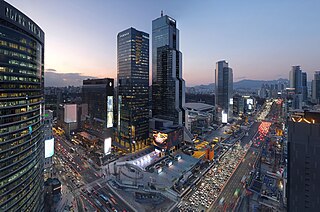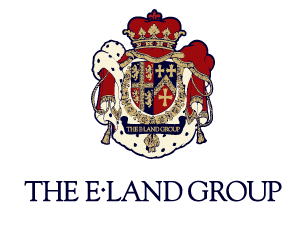
Concrete is a composite material composed of aggregate bonded together with a fluid cement that cures to a solid over time. Concrete is the second-most-used substance in the world after water, and is the most widely used building material. Its usage worldwide, ton for ton, is twice that of steel, wood, plastics, and aluminium combined.

A cement is a binder, a chemical substance used for construction that sets, hardens, and adheres to other materials to bind them together. Cement is seldom used on its own, but rather to bind sand and gravel (aggregate) together. Cement mixed with fine aggregate produces mortar for masonry, or with sand and gravel, produces concrete. Concrete is the most widely used material in existence and is behind only water as the planet's most-consumed resource.

The general term slag may be a by-product or co-product of smelting (pyrometallurgical) ores and recycled metals depending on the type of material being produced. Slag is mainly a mixture of metal oxides and silicon dioxide. Broadly, it can be classified as ferrous, ferroalloy or non-ferrous/base metals. Within these general categories, slags can be further categorized by their precursor and processing conditions. Slag generated from the EAF process can contain toxic metals, which can be hazardous to human and environmental health.

Tosoh Corporation is a global chemical and specialty materials company. The company was founded in 1935 in Yamaguchi Prefecture, as Toyo Soda Manufacturing Co., Ltd., and in 1987 changed its name to Tosoh Corporation. Today, its corporate headquarters are in Tokyo, Japan.

Gangnam District is one of the 25 districts of Seoul, South Korea. The term Gangnam translates to "South of the Han River". Gangnam District is the third largest district in Seoul, with an area of 39.5 km2 (15.3 sq mi). As of the 2024 census, Gangnam District had a population of 556,570. There is a high concentration of wealth in the district, with prices for an apartment as of 2024 more than double those in the rest of Seoul. Gangnam District is part of Gangnam School District Eight, along with the Seocho District. This district shares half of Gangnam-daero Gangnam Station area with Seocho District, which is one of the most crowded places in South Korea.
Hyundai Department Store (Korean: 현대백화점) is a major department store chain in South Korea. Its parent company is the Hyundai Department Store Group. It, Lotte Department Store, and Shinsegae are the three largest chains in the country.

E·Land Group (Korean: 이랜드그룹) is a South Korean conglomerate headquartered in Changjeon-dong Mapo-gu Seoul, South Korea. E-Land Group takes part in retail malls, restaurants, theme parks, hotels, and construction businesses as well as its cornerstone, fashion apparel business. It has operations worldwide through its subsidiary E-Land World. In 2023, E-Land Group has 15,132 employees and sales are KRW 4.592 trillion.
Asia Cement Co. Ltd. (Korean: 아세아시멘트) is South Korea's cement, concrete, and chemical company headquartered in Seoul, Korea. Established in 1957, the company primarily produces remicon and portland cement. Asia Cement Co., Ltd. is one of the three largest cement manufacturing companies in Korea.
Sampyo Cement is a South Korean cement, concrete and chemical company headquartered in Seoul. It produces portland cement products. It was established in 1957 as Tong Yang Cement by Lee Yang-gu as the second of his many companies which would grow into the Tongyang Group, and was also later known as Tongyang Cement and Energy.

Ground granulated blast-furnace slag is obtained by quenching molten iron slag from a blast furnace in water or steam, to produce a glassy, granular product that is then dried and ground into a fine powder. Ground granulated blast furnace slag is a latent hydraulic binder forming calcium silicate hydrates (C-S-H) after contact with water. It is a strength-enhancing compound improving the durability of concrete. It is a component of metallurgic cement. Its main advantage is its slow release of hydration heat, allowing limitation of the temperature increase in massive concrete components and structures during cement setting and concrete curing, or to cast concrete during hot summer.
SM Bexel Co, Ltd. is a South Korean chemical company specializing in battery manufacture. It is headquartered in Yangpyeong-dong Yeongdeungpo-gu, Seoul and Gongdan-dong, Gumi, Gyeongsangbuk-do, South Korea. Founded in 1978, it also manufactures other electronic products. Manufacturing is based in Gumi, Gyeongsangbuk-do.
Korea Cement Co, Ltd. (Korean: 고려시멘트) is a South Korean cement and chemical company, headquartered in Sinan-dong Buk-gu Gwangju, Korea. established in 1962. It is a manufacturer of cement products, and is under the Gangdong Group family. The CEO of Korea Cement is Lee Kuk No (이국노).

Construction aggregate, or simply aggregate, is a broad category of coarse- to medium-grained particulate material used in construction. Traditionally, it includes natural materials such as sand, gravel, crushed stone. As with other types of aggregates, it is a component of composite materials, particularly concrete and asphalt. Aggregates are the most mined materials in the world, being a significant part of 6 billion tons of concrete produced per year.

Jung District is one of the 25 districts of Seoul, South Korea. It has a population of 131,452 (2013) and has a geographic area 9.96 km2, making it both the least-populous and the smallest district of Seoul, and is divided into 15 dong. Jung is located at the centre of Seoul on the northern side of the Han River, bordering the city districts of Jongno to the north, Seodaemun to the northwest, Mapo to the west, Yongsan to the south, Seongdong to the southeast, and Dongdaemun to the northeast.

Gangseo District(Korean: 강서구; RR: Gangseo-gu; Korean pronunciation:[ka̠ŋ.sʰʌ̹.ɡu]) is one of the 25 wards (gu) of Seoul, South Korea. It is located on the south side of the Han River. Gimpo Airport is in Gonghang-dong, where many flights fly to cities like Busan, Jeju, and Gwangju.

Gwangjin District is one of the 25 districts of Seoul, South Korea. It is located on the north bank of the Han River on the eastern end of Seoul. The district was split from the neighboring Seongdong District in 1995. Gwangjin District is home to Konkuk University and Sejong University.
Hyundai Amco Co. Ltd. (Korean: 엠코건설), was a Korean construction company founded in October 2002 in Yangjae-dong Seocho-gu Seoul, South Korea. Currently, the company's CEO is Kim Chang Hee. AMCO is licensed by the Hyundai Motor Company, and its main line of business is construction products. The company researches new technologies such as the modularization method, and floating dock technology.

Crushed stone or angular rock is a form of construction aggregate, typically produced by mining a suitable rock deposit and breaking the removed rock down to the desired size using crushers. It is distinct from naturally occurring gravel, which is produced by natural processes of weathering and erosion and typically has a more rounded shape.
In 2006, Cambodia's mineral resources remained, to a large extent, unexplored. Between 2003 and 2006, however, foreign investors from Australia, China, South Korea, Thailand, and the United States began to express their interest in Cambodia's potential for offshore oil and gas as well as such land-based metallic minerals as bauxite, copper, gold, and iron ore, and such industrial minerals as gemstones and limestone.
Copper slag is a by-product of copper extraction by smelting. During smelting, impurities become slag which floats on the molten metal. Slag that is quenched in water produces angular granules which are disposed of as waste or utilized as discussed below.











